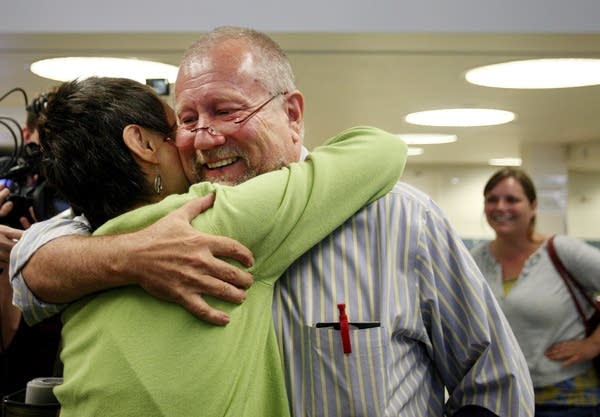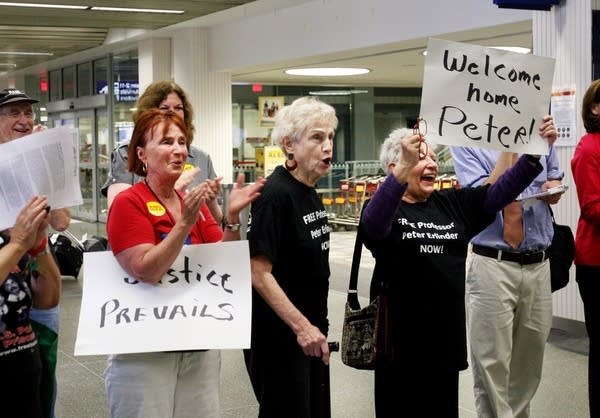After weeks in Rwandan jail, Erlinder arrives in Minn.
Go Deeper.
Create an account or log in to save stories.
Like this?
Thanks for liking this story! We have added it to a list of your favorite stories.

Minnesota law professor Peter Erlinder returned to the Twin Cities Tuesday after a Rwandan judge granted him bail on humanitarian grounds.
Erlinder, who was accused of promoting genocide ideology and was detained for about three weeks in Rwandan prisons, said he's thankful for efforts to put pressure on the Rwandan government.
"This was an example of globalized people's power, acting in a way that forced governments that didn't want to react to have to react," he said at a brief press conference at the Minneapolis-St. Paul International Airport, surrounded by friends, family, activists and reporters.
But Erlinder sharply denounced world leaders for what he said was a failure to press more forcefully for his release. The William Mitchell College of Law professor also had sharp words for the Rwandan government.
Turn Up Your Support
MPR News helps you turn down the noise and build shared understanding. Turn up your support for this public resource and keep trusted journalism accessible to all.
"They have made the Stasi and the KGB look like amateurs," he said, making a comparison to the former East German and Soviet secret police.
Erlinder had traveled to Rwanda to represent presidential candidate Victoire Ingabire against charges that she denied the country's 1994 genocide. He was arrested on May 28 and faces similar charges.

Rwandan officials have said their investigation against Erlinder continues.
Known for taking on unpopular clients and causes, Erlinder has been a pointed critic of Rwandan President Paul Kagame, and has been outspoken in his disagreement with the government's official explanation of the genocide. In April, Erlinder helped file a lawsuit in Oklahoma, accusing Kagame of ordering a plane that was carrying the presidents of Rwanda and Burundi to be shot down in 1994.
Rwanda's genocide killed more than 800,000 people, according to estimates by human rights groups -- mostly Tutsis and moderate Hutus. The massacres ended when mostly Tutsi rebels led by Kagame defeated the Hutus.
In a separate interview with MPR News, Erlinder said he didn't expect to be arrested when he arrived in the African country.
When asked about the letters he sent to the United Nations, members of Minnesota's congressional delegation, and others prior to his departure expressing concern about his personal safety, Erlinder said he was just being cautious.

He described being arrested at the hotel where he was staying as "the bad dream of the Western tourist, or bad spy novel or spy movie -- where you're sitting around having breakfast, eating a croissant [and] six burly African guys surround the table, say, 'Come with me,' and you go."
Erlinder said he thinks the Rwandan government would have arranged for his "disappearance," if he had not called the U.S. Embassy in Kigali to inform officials there that he had been arrested.
He said embassy officials told him they thought he had already left Rwanda -- and that he later learned that his plane records had been changed to show he already left the country when he hadn't. Erlinder said he was able to call for an embassy official to witness Rwandan officers search his hotel room.
"If that event had not happened, no one would have known what happened to me," he said.
Erlinder said he was first held in a detention center with no bed, blanket or pillow. He eventually was transferred to prison, where the conditions were much better, but he said he still feared for his life every day.
"I was completely helpless in a military dictatorship that considered me an enemy of the state," he said.
The 62-year-old professor, who was hospitalized four times during his detention, confirmed that he refused to take medication for high blood pressure and other ailments. He declined to address questions about his mental health or reports that he tried to commit suicide in prison.
Rwandan officials have said that Erlinder overdosed on prescription medication and had said he wanted to die. Erlinder later told a Rwandan judge that he had attempted suicide.
"Those are questions ... I had to discuss in court, in order to put the court in a position to understand that I have serious conditions that are worthy of humanitarian consideration," he said. "But I don't think I prefer to repeat those, or discuss them in settings where it isn't necessary to save my life."
Back at the airport, Erlinder told reporters that he is relieved to be home.
"Unlike Mark Twain, the stories of my demise are only slightly exaggerated," he said.
Erlinder confirmed that he will continue to work for Rwanda's international tribunal in Tanzania, where he defends individuals accused of perpetrating the genocide. He vowed to continue to challenge the government's official version of how the genocide happened, but said he would probably not return to Rwanda under its current leadership.
Erlinder clarified Wednesday that he would go back to Rwanda if he needed to defend himself from charges, as he promised the court.
"My intention is to keep my pledge, and let the investigation go forward, and then discuss questions of immunity if and when that becomes important," he said.







